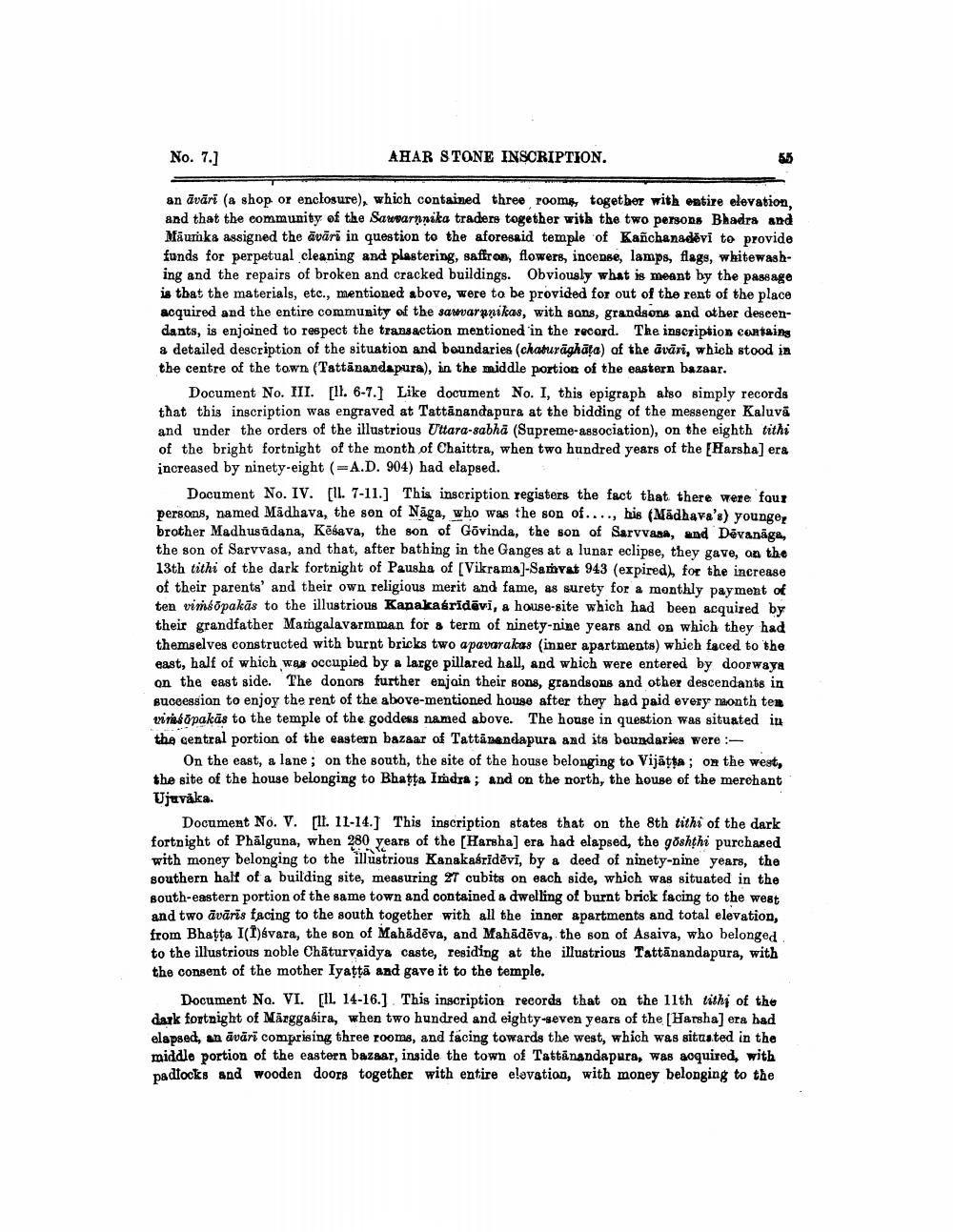________________
No. 7.1
an avāri (a shop or enclosure), which contained three rooms, together with entire elevation, and that the community of the Sauvarnnika traders together with the two persons Bhadra and Mäumka assigned the avārī in question to the aforesaid temple of Kanchanadevi to provide funds for perpetual cleaning and plastering, saffron, flowers, incense, lamps, flags, whitewashing and the repairs of broken and cracked buildings. Obviously what is meant by the passage is that the materials, etc., mentioned above, were to be provided for out of the rent of the place acquired and the entire community of the sauvaranikas, with sons, grandsons and other deseendants, is enjoined to respect the transaction mentioned in the record. The inscription contains a detailed description of the situation and boundaries (chaturaghata) of the avari, which stood in the centre of the town (Tattanandapura), in the middle portion of the eastern bazaar.
AHAR STONE INSCRIPTION.
55
Document No. III. [11. 6-7.] Like document No. I, this epigraph also simply records that this inscription was engraved at Tattānandapura at the bidding of the messenger Kaluvā and under the orders of the illustrious Uttara-sabha (Supreme-association), on the eighth tithi of the bright fortnight of the month of Chaittra, when two hundred years of the [Harsha] era increased by ninety-eight (=A.D. 904) had elapsed.
Document No. IV. [ll. 7-11.] This inscription registers the fact that there were four persons, named Madhava, the son of Naga, who was the son of...., his (Madhava's) younger brother Madhusudana, Kesava, the son of Govinda, the son of Sarvvasa, and Devanaga, the son of Sarvvasa, and that, after bathing in the Ganges at a lunar eclipse, they gave, on the 13th tithi of the dark fortnight of Pausha of [Vikrama]-Samvat 943 (expired), for the increase of their parents' and their own religious merit and fame, as surety for a monthly payment of ten vimsopakās to the illustrious Kanakaśrīdāvi, a house-site which had been acquired by their grandfather Mamgalavarmman for a term of ninety-nine years and on which they had themselves constructed with burnt bricks two apavarakas (inner apartments) which faced to the east, half of which was occupied by a large pillared hall, and which were entered by doorwaya on the east side. The donors further enjoin their sons, grandsons and other descendants in succession to enjoy the rent of the above-mentioned house after they had paid every month ten visōpakās to the temple of the goddess named above. The house in question was situated in the central portion of the eastern bazaar of Tattanandapura and its boundaries were :
On the east, a lane; on the south, the site of the house belonging to Vijāṭṭa; on the west, the site of the house belonging to Bhatta Indra; and on the north, the house of the merchant Ujuvāka.
Document No. V. [11. 11-14.] This inscription states that on the 8th tithi of the dark fortnight of Phalguna, when 280 years of the [Harsha] era had elapsed, the gōshthi purchased with money belonging to the illustrious Kanakasridevi, by a deed of ninety-nine years, the southern half of a building site, measuring 27 cubits on each side, which was situated in the south-eastern portion of the same town and contained a dwelling of burnt brick facing to the west and two āvāris facing to the south together with all the inner apartments and total elevation, from Bhaṭṭa I(I)svara, the son of Mahādēva, and Mahādēva, the son of Asaiva, who belonged to the illustrious noble Chaturvaidya caste, residing at the illustrious Tattanandapura, with the consent of the mother Iyaṭṭā and gave it to the temple.
Document No. VI. [IL. 14-16.] This inscription records that on the 11th tithi of the dark fortnight of Märggasira, when two hundred and eighty-seven years of the [Harsha] era had elapsed, an āvārī comprising three rooms, and facing towards the west, which was situated in the middle portion of the eastern bazaar, inside the town of Tattanandapura, was acquired, with padlocks and wooden doors together with entire elevation, with money belonging to the




